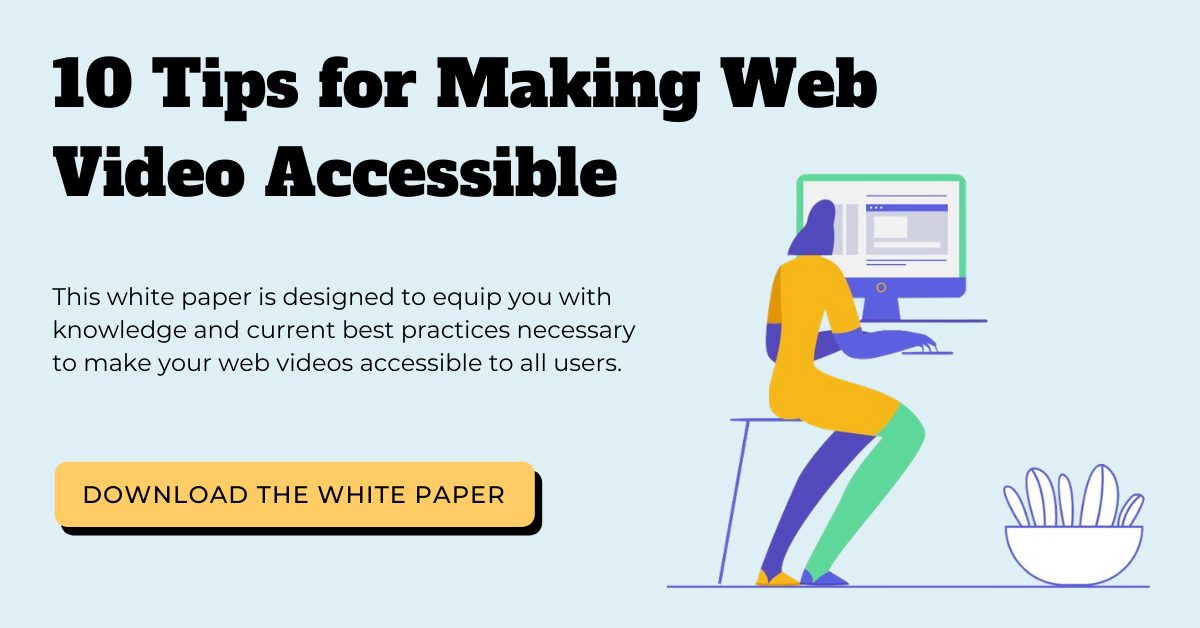The True Cost of Video Accessibility Lawsuits
Updated: March 2, 2021
Video accessibility lawsuits happen, but no company or organization wants one to land on its doorstep.
Companies incur costs when making videos accessible. However, the costs incurred during a lawsuit can reach a more substantial sum.
Settlement costs are only one piece of the pie, and it turns out that the true cost of video accessibility lawsuits may be more significant than you think.
The Cost of Video Accessibility Lawsuits
It’s likely unsurprising to hear that the monetary cost of video accessibility lawsuits is substantial.
Harvard was sued in 2015 by the National Association of the Deaf (NAD) for allegedly failing to provide appropriately accurate and comprehensive captioning for online course materials. In the end, the NAD and Harvard came to a mutual settlement in which Harvard agreed to caption all online resources accurately. But, Harvard was required to pay $1.6 million in attorney fees for the plaintiffs.
The Massachusetts Institute of Technology (MIT) underwent a similar lawsuit with a similar outcome. MIT, too, was subject to pay just over $1 million in reasonable attorney’s fees, expenses, and costs.
These attorney’s fees are not insignificant, and according to Sheri Byrne-Haber, Head of Accessibility at VMware, the cost of video accessibility lawsuits can reach much higher amounts and create more than just a financial burden.
Brand Reputation
When hit with a lawsuit, companies and organizations may face a severely tarnished brand reputation, particularly among people with disabilities, who make up 26% of the US population – that’s one in four people.
By not practicing video accessibility specifically, brands are discriminating against people with disabilities, particularly those who are deaf or hard of hearing (5% of the US population) and people who are blind or have low vision (more than 3.4 million Americans).
The cost of forgoing adequate video accessibility practices could be lost revenue and lost customers. Who would want that?
Other Significant Costs
Besides attorneys and settlement fees, defendants can expect to incur many more financial costs after the initial filing of a lawsuit.
These costs include:
- Defendant’s costs (both internal/external legal counsel)
- Expert costs
- Mediation or alternative dispute resolution costs
- Emergency accessibility remediation costs
- Post-settlement requirement costs
- Stacked lawsuits (non-class action lawsuits may multiply)
- Marketing costs to aid in rebuilding audience trust
All in all, each of these factors can contribute to a bill upwards of millions of dollars.
The Cost of Video Accessibility
Video accessibility is not a free process by any means. However, planning for captioning, audio description, and other video accessibility needs can help save money in the long run, mainly if it helps mitigate the risk of video accessibility lawsuits.
How much does video accessibility cost?
Captioning
If you choose to conduct video accessibility processes in house, you can expect to pay in resource time and labor costs. In one estimate, which factored in approximate labor costs and time commitment, in-house captioning costs equated to $165/hour of video content.
The cost of utilizing a third-party vendor is calculated differently. Most captioning vendors charge per minute, anywhere from $1.50 to $5 per minute, so the cost depends entirely on how much video content you produce. The estimated price could range from $90 to $300 per hour-long video file. There may also be additional costs for added capabilities such as caption formats, video platform integrations, and turnaround times.
Keep in mind that not all captioning vendors are created equal in terms of quality and accuracy. Some vendors proclaim a 99% accuracy rate but fall drastically short of this standard. Low-quality, low-accuracy captions don’t provide a truly accessible experience for all viewers.
Audio Description
Audio description is an accessibility feature that aids people who are blind and low vision in watching video content. It narrates the relevant, important visual information within video content.
Audio description prices can range from $9-$75 per minute, though there are lower-priced vendors that use technology to reduce costs. 3Play Media, for instance, uses a combination of humans and technology to provide a more affordable alternative to traditional audio description prices.
Why is audio description more costly than captioning? Creating audio description requires significant time and resources, attention to detail, and a high level of skill. It also requires experienced people and expensive equipment. With multiple hours of content to describe, these costs can add up quickly.
The Benefits Outweigh the Costs
From this vantage point, it seems clear that the benefits of planning for video accessibility today far outweigh the costs and the risk of being slammed with video accessibility lawsuits.
The value of video accessibility is truly tangible, as studies often show. Accessible videos are known to provide a better viewing experience and to improve user engagement. Companies can reach more people, create a powerful, inclusive brand image, and reap real video ROI in boosted viewership and search engine visibility.
Plus, video accessibility mitigates your risk of ever facing a drawn-out, expensive, and brand-tarnishing lawsuit.
Need guidance on how to make your videos more accessible? This ebook provides ten tips for making web videos accessible.
This blog post is written for educational and general information purposes only, and does not constitute specific legal advice. This blog should not be used as a substitute for competent legal advice from a licensed professional attorney in your state.









